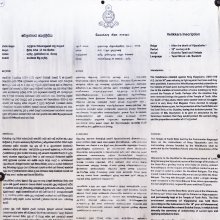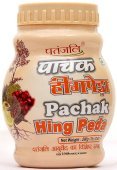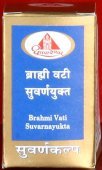Peta, Petà, Pētā: 19 definitions
Introduction:
Peta means something in Buddhism, Pali, Hinduism, Sanskrit, Marathi, Hindi, biology, Tamil. If you want to know the exact meaning, history, etymology or English translation of this term then check out the descriptions on this page. Add your comment or reference to a book if you want to contribute to this summary article.
Images (photo gallery)
In Buddhism
Theravada (major branch of Buddhism)
Source: Pali Kanon: Manual of Buddhist Terms and DoctrinesGosts (peta):—cf. peta, yakkha; s. loka.
Theravāda is a major branch of Buddhism having the the Pali canon (tipitaka) as their canonical literature, which includes the vinaya-pitaka (monastic rules), the sutta-pitaka (Buddhist sermons) and the abhidhamma-pitaka (philosophy and psychology).
Biology (plants and animals)
Source: Wisdom Library: Local Names of Plants and DrugsPetha [पेठा] in the Hindi language is the name of a plant identified with Cucurbita moschata Duchesne from the Cucurbitaceae (Pumpkin) family having the following synonyms: Cucurbita macrocarpa, Pepo moschata, Cucurbita meloniformis. For the possible medicinal usage of petha, you can check this page for potential sources and references, although be aware that any some or none of the side-effects may not be mentioned here, wether they be harmful or beneficial to health.
Petha [पेठा] in the Hindi language is the name of a plant identified with Benincasa pruriens f. hispida (Thunb.) de Wilde & Duyfjes from the Cucurbitaceae (Pumpkin) family having the following synonyms: Benincasa cerifera, Cucurbita hispida, Benincasa hispida.
Source: Google Books: CRC World Dictionary (Regional names)Peta in Guinea-Bissau is the name of a plant defined with Avicennia germinans in various botanical sources. This page contains potential references in Ayurveda, modern medicine, and other folk traditions or local practices It has the synonym Hilairanthus nitidus (Jacq.) Tiegh. (among others).
Example references for further research on medicinal uses or toxicity (see latin names for full list):
· Bulletin de la Société Botanique de France (1918)
· Revisio Generum Plantarum (1891)
· Flore d’Oware (1809)
· Enumeratio Systematica Plantarum (1760)
· Phytologia (1974)
· Kew Bulletin (1958)
If you are looking for specific details regarding Peta, for example health benefits, pregnancy safety, diet and recipes, side effects, extract dosage, chemical composition, have a look at these references.

This sections includes definitions from the five kingdoms of living things: Animals, Plants, Fungi, Protists and Monera. It will include both the official binomial nomenclature (scientific names usually in Latin) as well as regional spellings and variants.
Languages of India and abroad
Pali-English dictionary
Source: Sutta: The Pali Text Society's Pali-English DictionaryPeta, (pp of pa+ī, lit. gone past, gone before) dead, departed, the departed spirit. The Buddhistic peta represents the Vedic pitaraḥ (manes, cp. pitṛyajña), as well as the Brāhmaṇic preta. The first are souls of the “fathers, ” the second ghosts, leading usually a miserable existence as the result (kammaphala) or punishment of some former misdeed (usually avarice). They may be raised in this existence by means of the dakkhiṇā (sacrificial gift) to a higher category of mahiddhikā petā (alias yakkhas), or after their period of expiation shift into another form of existence (manussa, deva, tiracchāna). The punishment in the Nirayas is included in the peta existence. Modes of suffering are given S. II, 255; cp K. S. ii, 170 p. On the whole subject see Stede, Die Gespenstergeschichten des Peta Vatthu, Leipzig 1914; in the Peta Vatthu the unhappy ghosts are represented, whereas the Vimāna Vatthu deals with the happy ones.—1. (souls of the departed, manes) D. III, 189 (petānaṃ kālakatānaṃ dakkhiṇaṃ anupadassati); A. III, 43 (id.); I, 155 sq.; V, 132 (p. ñātisalohita); M. I, 33; S. I, 61=204; Sn. 585, 590, 807 (petā-kālakatā=matā Nd1 126); J. V, 7 (=mata C.); Pv. I, 57; I, 121; II, 610. As pubba-peta (“deceased-before”) at A. II, 68; III, 45; IV, 244; J. II, 360.—2. (unhappy ghosts) S. II, 255 sq.; Vin. IV, 269 (contrasted with purisa, yakkha & tiracchāna-gata); A. V, 269 (dānaṃ petānaṃ upakappati); J. IV, 495 sq. (yakkhā pisācā petā, cp. preta-piśācayoḥ MBhār. 13, 732); Vbh. 412 sq.; Sdhp. 96 sq.—manussapeta a ghost in human form J. III, 72; V, 68; VvA. 23. The later tradition on Petas in their var. classes and states is reflected in Miln. 294 (4 classes: vantāsikā, khuppipāsā, nijjhāma-taṇhikā, paradatt’ûpajīvino) & 357 (appearance and fate); Vism. 501=VbhA. 97 (as state of suffering, with narakā, tiracchā, asurā); VbhA. 455 (as nijjhāmataṇhikā, khuppipāsikā, paradatt’upajīvino). ‹-› 3. (happy ghosts) mahiddhikā petī Pv. I, 101; yakkha mahiddhika Pv IV. 154; Vimānapeta mahiddhika PvA. 145; peta mahiddhika PvA. 217. (Cp. BSk. pretamahardhika Divy 14).—f. petī Vin. IV, 20; J. I, 240; Pv. I, 62; PvA. 67 and passim. Vimānapetī PvA. 47, 50, 53 and in Vimāna-vatthu passim.—upapattika born as a peta PvA. 119.—katha (pubba°) tales (or talk) about the dead (not considered orthodox) D. I, 8, cp. DA. I, 90; A. V, 128.—kicca duty towards the deceased (i.e. death-rites) J. II, 5; DhA. I, 328.—rājā king of the Petas (i.e. Yama) J. V, 453 (°visayaṃ na muñcati “does not leave behind the realm of the Petaking”); C. expls by petayoni and divides the realm into petavisaya and kālakañjaka-asura-visaya.—yoni the peta realm PvA. 9, 35, 55, 68, 103 and passim.—loka the peta world Sdhp. 96.—vatthu a peta or ghost-story; N. of one (perhaps the latest) of the canonical books belonging to the Suttanta-Piṭaka KhA 12; DA. I, 178 (Aṅkura°). (Page 472)

Pali is the language of the Tipiṭaka, which is the sacred canon of Theravāda Buddhism and contains much of the Buddha’s speech. Closeley related to Sanskrit, both languages are used interchangeably between religions.
Marathi-English dictionary
Source: DDSA: The Molesworth Marathi and English Dictionarypēṭa (पेट).—m (pēṭa S through H) Properly the chamber, but more frequently the charge, of a gun. 2 The report of a gun. 3 f m (pēṭaṇēṃ) Kindling or taking fire, igniting. v ghē. 4 W Patting or beating in order to level and smoothen. 5 f W (pēṭī) A box or chest.
--- OR ---
pēṭā (पेटा).—m (pēṭa S through H Belly.) Sphere, compass, comprehension, including quality or power: e. g. that of the provincial or county town over the minor towns and villages, that of a key-fort over the circumjacent country, that of a person of authority over his subordinates. Ex. ēkā nagarācyā pēṭyānta śambhara gāṃva asatāta; mōṭhyā puruṣāsa āmantraṇa kēlēṃ mhaṇajē tyācyā pēṭyānta lāhanasāhana yētāta. 2 A division of country consisting of a number of small towns and villages; a subdivision of a paragaṇā or tālukā. See under dēśa. 3 A box-trap for tigers. 4 C (Or pēṭēṃ) A float composed of gourds &c. to cross rivers. 5 (Or pēṭā from H) A kind of gourd. 6 A bundle or head-load of thorny loppings or of uprooted plants (esp. of karaḍaī or harabharā or of barked ambāḍī or tāga): also a stack or heaped mass of such plants. 7 A cub of a tiger or lion. 8 Used by some, with the designating noun preceding, of the cub or whelp or young one (esp. as sleek and pretty) of a dog, cat, sow, hare &c. 9 In algebra. The side of an equation.
Source: DDSA: The Aryabhusan school dictionary, Marathi-Englishpēṭa (पेट).—m The charge of a gun. The report of a gun. m Kindling fire, igniting.
--- OR ---
pēṭā (पेटा).—m Sphere of influence; a subdivi- sion of a tālukā. A float composed of gourds &c. to cross rivers. A cub of a tiger or lion.
Marathi is an Indo-European language having over 70 million native speakers people in (predominantly) Maharashtra India. Marathi, like many other Indo-Aryan languages, evolved from early forms of Prakrit, which itself is a subset of Sanskrit, one of the most ancient languages of the world.
Sanskrit dictionary
Source: DDSA: The practical Sanskrit-English dictionaryPeṭa (पेट).—(-ṭā, -ṭī -ṭam also)
1) A bag, basket
2) A chest.
3) A multitude.
4) A retinue, train.
-ṭaḥ The open hand with the fingers extended.
Derivable forms: peṭaḥ (पेटः).
Source: Cologne Digital Sanskrit Dictionaries: Shabda-Sagara Sanskrit-English DictionaryPeṭa (पेट).—mf. (-ṭaḥ-ṭā or -ṭī) A basket, a bag, a chest, a large basket. m.
(-ṭaḥ) The open hand with the fingers extended. E. piṭ to collect, ghañ and ṭāp affs.
Source: Cologne Digital Sanskrit Dictionaries: Benfey Sanskrit-English DictionaryPeṭa (पेट).—m., and f. ṭā and ṭī. A basket, bag, [Pañcatantra] 126, 2; 127, 1.
Source: Cologne Digital Sanskrit Dictionaries: Cappeller Sanskrit-English DictionaryPeṭa (पेट).—[masculine] or [neuter], ā & ī [feminine] basket, bag.
Source: Cologne Digital Sanskrit Dictionaries: Monier-Williams Sanskrit-English Dictionary1) Peṭa (पेट):—mf(ā, or ī)n. ([from] piṭa, °ṭaka, q.v.) a basket, bag, [cf. Lexicographers, esp. such as amarasiṃha, halāyudha, hemacandra, etc.]
2) a multitude, [cf. Lexicographers, esp. such as amarasiṃha, halāyudha, hemacandra, etc.]
3) a retinue, [cf. Lexicographers, esp. such as amarasiṃha, halāyudha, hemacandra, etc.]
4) m. the open hand with the fingers expanded (= pra-hasta), [cf. Lexicographers, esp. such as amarasiṃha, halāyudha, hemacandra, etc.]
Source: Cologne Digital Sanskrit Dictionaries: Yates Sanskrit-English DictionaryPeṭa (पेट):—[(ṭaḥ-ṭā-ṭī)] 1. m. 3. f. A basket.
Source: DDSA: Paia-sadda-mahannavo; a comprehensive Prakrit Hindi dictionary (S)Peṭā (पेटा) in the Sanskrit language is related to the Prakrit word: Peḍā.
[Sanskrit to German]
Sanskrit, also spelled संस्कृतम् (saṃskṛtam), is an ancient language of India commonly seen as the grandmother of the Indo-European language family (even English!). Closely allied with Prakrit and Pali, Sanskrit is more exhaustive in both grammar and terms and has the most extensive collection of literature in the world, greatly surpassing its sister-languages Greek and Latin.
Hindi dictionary
Source: DDSA: A practical Hindi-English dictionary1) Peṭa (पेट) [Also spelled pet]:—(nm) the belly, abdomen, stomach; womb; mind; the front side of a thing as opposed to the back (as [roṭī kā peṭa]); (fig.) livelihood; ~[poṃchanā] the last of a woman’s children (as •[beṭā] the last and the youngest son); ~[vālī] a pregnant woman; —[aiṃṭhanā] to have abdominal convulsions; to have an itch for disclosing a secret; —[kā] born of; —[kā gaharā] one who does not talk out secrets; who can contain secrets; —[kāṭanā] to save money by imposing self-restraint; —[kā cakkara/dhaṃdhā] business of earning a livelihood; —[kā pānī na pacanā] not to be able to keep/contain secrets; —[kā pānī na hilanā] to have no physical movement whatever, to be absolutely inert and static; —[kā halakā] one who cannot keep/contain secrets; —[kā hāla, — kī bāta] a secret, secrets stored within; —[kī āga/jvālā] the irresistible pangs of hunger; hunger; —[kī thāha lenā] to have an idea of one’s inmost feelings; to fathom the depth of one’s mind; —[kī āga bujhānā] to satisfy one’s hunger; to fill the stomach; —[kī thāha lenā] to probe into one’s mind; —[kī māra māranā] to deprive of bread; to deprive of the means of livelihood; —[kulabulānā] to be too hungry, to have abdominal uneasiness through hunger; —[kholanā] to talk out one’s mind; to reveal one’s secrets; to give vent to one’s grouses/resentments; —[giranā] to abort, to commit abortion; —[calanā] to suffer from diarrhoea; to have loose motions; —[chaṃṭanā] one’s paunch to be trimmed; —[para churī calānā/lāta māranā] to take the bread out of one’s mouth, to deprive one of means of livelihood; —[pālanā] to earn one’s living somehow; to subsist by effort; —[pīṭha se laganā, —pīṭha eka ho jānā] to be emaciated, to be reduced to a skeleton; ~[pūjā karanā] to serve the stomach, to fill the stomach; —[phūlanā] the abdomen to be swollen, the belly to bulge out; to be pregnant; not to be able to keep/contain a secret; —[baḍā honā] one’s demands to be enormous; —[bhārī honā] the stomach to be heavy (through indigestion); —[meṃ ghusanā] to delve deep into somebody’s mind; to develop intimate relations, to get out one’s secret; —[meṃ cūhe kūdanā/dauḍanā] to suffer the pangs of hunger; to be very hungry; —[meṃ ḍālanā], ([kucha]) to have something to eat, to fill the stomach; —[meṃ dāḍhī honā] to have an old head over young shoulders; to be very shrewd and cunning, to be seemingly simple but actually shrewd; —[rahanā] to become pregnant; —[se honā] to be in the family way, to be pregnant.
2) Peṭā (पेटा):—(nm) a sub-entry; abdomen, middle part of a thing; hull (of a ship),
...
Kannada-English dictionary
Source: Alar: Kannada-English corpusPēṭa (ಪೇಟ):—
1) [noun] a metal container, usu. rectangular, with a hinged or detachable lid, for keeping things; a box.
2) [noun] a group of people; a multitude.
3) [noun] a train of attendants.
4) [noun] an open hand with the fingers stretched and spread.
--- OR ---
Pēṭa (ಪೇಟ):—[noun] any of various styles of headdress worn by men consisting of a length of cloth wound in folds about the head; a turban.
--- OR ---
Pēta (ಪೇತ):—
1) [noun] the supposed disembodied spirit of a dead person; a ghost; a spectre.
2) [noun] the dead body of a person.
3) [noun] a coward; a chicken-hearted man.
Kannada is a Dravidian language (as opposed to the Indo-European language family) mainly spoken in the southwestern region of India.
Nepali dictionary
Source: unoes: Nepali-English DictionaryPeṭa (पेट):—n. 1. belly; stomach; 2. womb; 3. mind; soul; 4. inner part of the hollow object; 5. bag;
Nepali is the primary language of the Nepalese people counting almost 20 million native speakers. The country of Nepal is situated in the Himalaya mountain range to the north of India.
See also (Relevant definitions)
Starts with (+92): Peta sing, Peta Vatthu, Peta-vatacaivam, Petaar, Petaari, Petaboli, Petaca, Petacaivam, Petacas, Petacciuola pelosa, Petacciuola piccola, Petagar mangas, Petaguli, Petaha, Petai, Petai balong kecil, Petai belalang, Petai belalong, Petai belanda, Petai cina.
Ends with (+113): Abharanopeta, Abhyupeta, Acarapeta, Acaravyapeta, Acharavyapeta, Adhippeta, Ahipeta, Ajjhupeta, Anapeta, Anupeta, Apeta, Ardhapeta, Arnavapeta, Ashtangopeta, Asmanacapeta, Avaranopeta, Avyapeta, Bahupushpaphalopeta, Balopeta, Brahmapeta.
Full-text (+219): Peda, Petha, Petaka, Petamarru, Vittapeta, Petika, Usukaraniya Sutta, Pethacalana, Adas pedas, Pedhe, Peda kalinga, Pethapada, Subhapeta, Petakandaka, Petalu, Petattana, Vastrapeta, Petappo, Pata-petarokam, Gutha.
Relevant text
Search found 42 books and stories containing Peta, Pēṭa, Peṭa, Pēṭā, Peṭā, Pēta, Petha, Pēṭha, Petà, Pētā, Peda, Pedaa, Paedaa, Pethaa, Paethaa, Pedha; (plurals include: Petas, Pēṭas, Peṭas, Pēṭās, Peṭās, Pētas, Pethas, Pēṭhas, Petàs, Pētās, Pedas, Pedaas, Paedaas, Pethaas, Paethaas, Pedhas). You can also click to the full overview containing English textual excerpts. Below are direct links for the most relevant articles:
Abhidhamma in Daily Life (by Ashin Janakabhivamsa) (by Ashin Janakabhivamsa)
Domain 7 - Pattanumodana (rejoicing at patti-dana) < [Chapter 6 - Ten domains of meritorious actions (ten punna kiriyavatthu)]
Factor 10 - Macchariya (jealousy, selfishness) < [Chapter 2 - On akusala cetasikas (unwholesome mental factors)]
Part 1 - The nature of hells (niraya) < [Chapter 11 - Planes Of Existence]
Guide to Tipitaka (by U Ko Lay)
Part 7 - Peta Vatthu Pali < [Chapter VIII - Khuddaka Nikaya]
(b) Nidana Vagga Samyutta Pali < [Chapter VI - Samyutta Nikaya]
The Great Chronicle of Buddhas (by Ven. Mingun Sayadaw)
Part 3 - The Buddha’s Delivery of The Tirokuṭṭa Sutta < [Chapter 15 - The buddha’s visit to Rājagaha]
Chapter 8 - Eighteen Abhabbaṭṭhānas < [Volume 1.2]
Biography (17): Soṇa Kuṭikaṇṇa Mahāthera < [Chapter 43 - Forty-one Arahat-Mahatheras and their Respective Etadagga titles]
The Buddha and His Teachings (by Narada Thera)
Chapter XXVII - Planes of Existence
Chapter XXVI - Modes of Birth and Death
Vinaya Pitaka (1): Bhikkhu-vibhanga (the analysis of Monks’ rules) (by I. B. Horner)
Translation of the terms Dhamma and Tathāgata < [Translator’s Introduction]
Monks’ Expulsion (Pārājika) 2: Non-offence clause < [Monks’ Expulsion (Pārājika) 2]
Monks’ Expulsion (Pārājika) 4: Case rulings < [Monks’ Expulsion (Pārājika) 4]
The Catusacca Dipani (by Mahathera Ledi Sayadaw)
Part IV - The Burden Of Dukkha In The Lower Planes < [The Exposition Of Four Characteristics]
Crowded In Avici Hell < [Part I - The Manual Of The Four Noble Truths]
Related products






